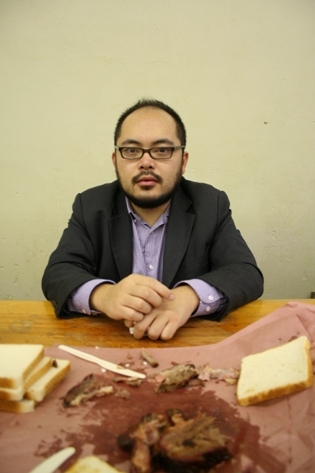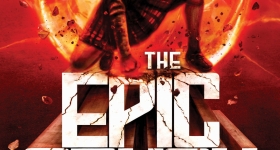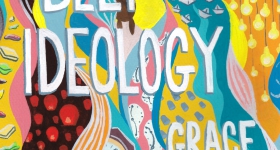On the spectrum of Asian immigrant parents, the unrelentingly strict Tiger Mother sits at one end, and the indulgent parents of Malcolm Kwan, the protagonist of Beauty Plus Pity, at the other. “With the parents I had,” says Malcolm, “I could aim only to be an artist or, failing that, someone who at least swung honourably in that designation.” A look at Malcolm’s life could be proof that the Tiger Mother may be onto something with her parenting methods: Malcolm hasn’t even really tried to be an artist, and his “honorable” swing in that direction is working at a record store and trying to become a fashion model.
Most entrants in the slacker genre take the pack of twenty-something friends as its core unit, but Beauty plus Pity by Kevin Chong draws its focus on Malcolm’s family. The novel’s action unfolds through the loss and gain of family members: the death of his father, whose funeral turns up a long-lost half-sister, Hadley, the result of a long-ago affair; the break-up with his fiancée that leads him to back to an ex-girlfriend. Against these genuine traumas, Malcolm is just looking to find himself.
And so Beauty plus Pity rests entirely on Malcolm’s model shoulders. Models are easy to dismiss as vapid, and Malcolm so much as admits it himself: “Photos gave me soul, or at least a complexity I didn’t necessarily possess.” Malcolm’s matter-of-the-fact voice narrates the novel, and he is indeed a passive character, not always lovable in his loserness. “You felt safe around me, because I was plain-looking,” says his scathingly accurate ex-fiancée. “We got engaged because you didn’t want to involve yourself with anyone was who was hard to get.” Although beautiful and pitiable, Malcolm isn’t necessarily pitiful. There’s something endearing about him after all, and that is the novel’s saving grace. In spite of his failings, Malcolm is trying at one thing, and that is trying to be a good person.
The novel’s pulsating heart lies in Malcolm’s relationship with his teenage half-sister Hadley, the daughter of an actress with whom their father had an affair. In his characteristically cryptic fashion, Malcolm has little to say about his initial reaction to Hadley, but their relationship evolves into a tender one of mutual appreciation. It is because of Hadley that Malcolm is pulled out of his navel-gazing, forced to confront her tangible world of water polo practices and afterschool hangouts. When Hadley, who had grown up working-class, tells Malcolm she had envied his childhood as the legitimate son of a successful commercial film director, it is the first time Malcolm recognizes his own privilege.

author photo by Lee Henderson
Beauty plus Pity takes its title from Nabokov, who once said that the two together is the closest approximation to a definition of art. Similarly, art and the privilege afforded by money intertwine in the novel. Malcolm’s parents both have artistic inclinations but neither are artists in the mold of the mystical creative genius. His father is a Hong Kong filmmaker turned rueful director of Canadian television ads like that of Ninja Pizza, which claims with gusto, “Since imperial time, Ninja Pizza bring [sic] hungry people best two-for-one pizza.” His mother becomes a successful painter and art teacher in Vancouver, but only in middle-age, after her husband was making good money from directing commercials and paid for art lessons. Malcolm inherits the belief in pure art’s superiority -- he initially scoffs when Hadley tells him she doesn’t care for music -- even as he sees no place for himself in the art world. Ambivalent about the value of creating art, Malcolm tries out the modeling thing, the long-term prospects of which are hazy.
Not much is made of how unusual Malcolm’s parents are for Asian immigrant parents, probably because the novel takes place in Vancouver, where the Asian population is so large and diverse that not all Asian parents fit a singular archetype. The issue of Malcolm’s ethnicity apropos to his modeling career (can you name a single Asian male model?) is mentioned only once and in a favorable light, when his agent points out that the percentage of Asian male models is much lower than the percentage of Vancouver that is Asian. Of all the identity crises Malcolm contends with, ethnicity is not one of them.
In this way, Beauty plus Pity reads like any novel about a twenty-something with growing pains. Chong punctuates his prose with observations of blade-like precision and chill, such as when Malcolm describes meeting a long-cherished former colleague of his father’s: “Something inside me plunged, as I learned that my father’s intense recollection of his time with Chew had not been reciprocated. As his proxy, I felt his embarrassment carpeting my skin like hives.” When revelations and family secrets begin piling up in the third act, however, Chong’s keen eye gets buried under the foam of soap opera-like dramatic twists. If you wade through that foam, there’s a well-written portrait of the (maybe) artist as a young man.
Sarah Zhang is a writer based on Cambridge, MA. She is the online editor of The New Inquiry.









Comments